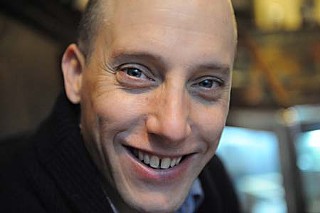Home-Pun Humor
O. Henry Pun-Off champ John Pollack has his way with words
By Kimberley Jones, Fri., May 20, 2011
Punning might seem like just a goof, but it gave John Pollack a very serious edge when it came to seeking gainful employment. The winner of the 1995 O. Henry Pun-Off World Championship (which has been an Austin institution for three and a half decades), Pollack recalls a job interview he had for a position as a speechwriter for President Bill Clinton. "I was up against this Pentagon speechwriter who had more experience, better connections. I really wanted that job, but you know, the odds were against me. I'm told – I didn't see the memo – but a decision memo goes to the president on who to hire. He circles 'World Pun Champion,' writes 'good' in the margin – exclamation point – and I got the job."
Pollack returned to the championship in 2010 to do research for his new book, The Pun Also Rises: How the Humble Pun Revolutionized Language, Changed History, and Made Wordplay More Than Some Antics (Gotham Books). He'll serve as one of the judges for the 34th Annual O. Henry Pun-Off World Championship, which takes place Saturday, May 21, 11am-6pm, at Brush Square (409 E. Fifth, behind the O. Henry and Dickinson Hannig museums).
Austin Chronicle: You immersed yourself in the world of punning for the book. Has it made you a better punster?
John Pollack: I would say what's changed is I have a much greater appreciation of why we pun and the roles that puns have played in history and in the rise of civilization. We think of puns today as being something light, fun, sometimes goofy. But they really have played a very important role in the evolution of language and all the incredible things that language has enabled people to achieve in this world.
AC: The common perception of puns is that they are exclusively the domain of comedy, but in the book you point out that historically speaking that's not accurate.
JP: Puns are defined by multiplicity of meaning. But what I was really startled to find out was what an important role they had played in the invention of the alphabet – the invention of the alphabet would have been impossible without puns. And so everything that the alphabet has enabled in terms of learning, science, and progress would have been impossible without puns. So we really need to be grateful for the human instinct to make puns.
AC: But is there a more reviled form of wordplay, do you think?
JP: Puns take a lot of abuse, and what's interesting is that irony and sarcasm and punning are all ways we say one thing and mean another. But sarcasm and irony are celebrated in our society, and punning is denigrated. And really, it should be the other way around. Sarcasm and irony are acts of deconstruction – they're tearing something down. Puns are about building associations between two things. They're about building something up in a positive way. But it's always harder to create than it is to tear down, and so I think that's why sarcasm and irony get off easy, because they're safe. They're just tearing something down that someone else has done, whereas punning requires a leap of faith and an act of imagination. That's always going to be a riskier endeavor, and some people are risk-averse.
AC: Your book makes a compelling case that puns deserve real respect as an art form.
JP: There's a tendency in our society to talk about lame puns or bad puns, et cetera, as if all puns fell into those categories, and that's definitely not the case. For those that doubt that, I say, look at the marketplace – the marketplace of laughter and the marketplace of commerce give strong evidence that the pun sells. Look at all the product names that are puns, you know, Caramel Sutra and Cherry Garcia ice cream for Ben & Jerry's. ...
Just today I was reading in the paper that 40 freshman Republican members of Congress wrote a letter accusing the Democrats of "Medi-scare" tactics. "Medicare" and "scare" – Medi-scare tactics. That's not an attempt to get laughter. It's not an attempt to get a groan. ... It's a very efficient way of conveying two ideas in one and their relationship. And so puns are a really useful tool. ...
People use puns all the time; they just don't necessarily think of them as puns. ... It's the natural impulse to play with language that has fueled human progress in many ways. It's not the sole factor. You know, that and opposable thumbs. They make a big difference in our lives.









